Last updated on 07/29/2020
July 28 @ 9 am. You can register for the sessions here.
Usual disclaimer: my thoughts on what people are saying, trying to say, trying to be thinking, etc. Nothing is a quote unless in ” ” ‘s.
Costs faculty and OA’s $19.5M
Admin Caucus until 10:15. 11:10.
The admin is back with a a counter.
I’ll post more later, but their basic plan, in contrast to the union proposal, is to tax middle wage workers more and reduce the tax on the high earners, who are mostly upper administrators. What a surprise.
11:30 AM – I’ll add that Brad Shelton is making an ass of himself, as usual.
2:08 PM – I’ve missed a bunch of nothing, they are caucusing until 2:30.
2:30: They’re back, Brad has a new plan. Missy is saying it’s another ultimatum offer:
In a nutshell, this takes more from midrange faculty and OA’s, and less from the high income upper admins than the union’s plan. It also leaves the stipend loophole – no tax on car, cellphone, other stipends.
2:45 – Union is caucusing.
4:22 I missed some more, they’re back.
I believe the above is the final agreed on salary cut package – i.e. the “New UO” version. Here is the continuous version:
Find your base salary on the x axis, go up to the yellow line, read your pay cut off the y axis. So if you make $100,000, your salary after cuts will be $100K*(1-0.0629) = $93,710.
These are the maximum cuts, to be imposed if the revenue shortfall is $35M or more.
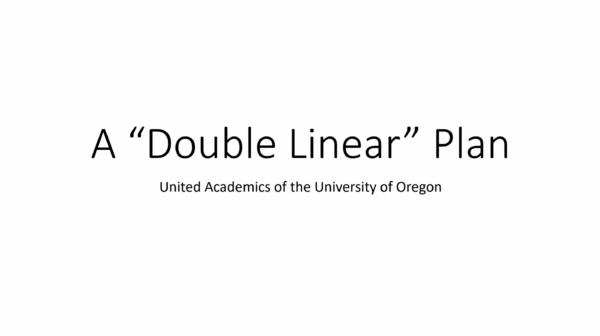
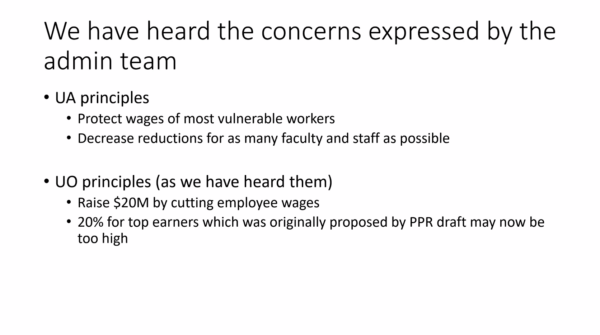
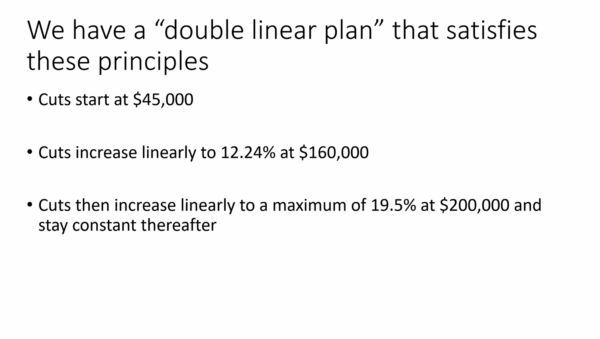
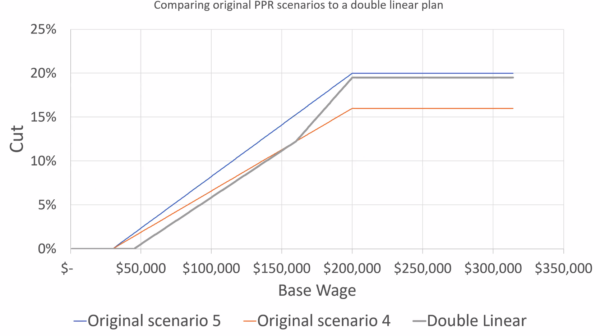
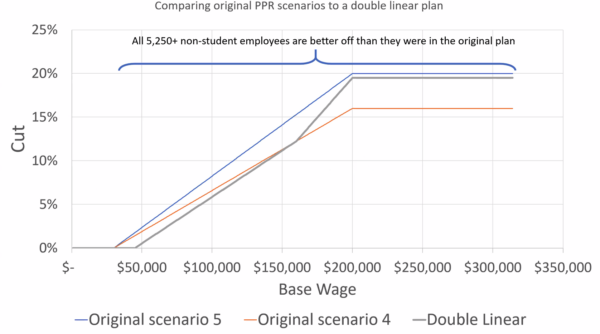
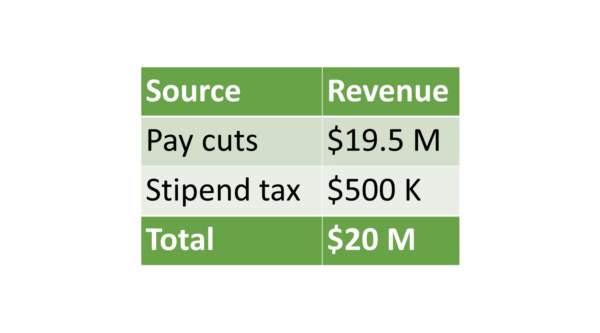
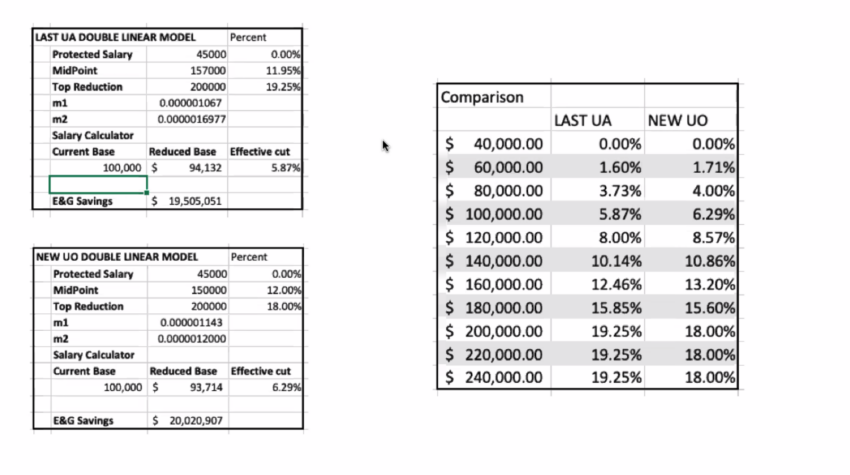
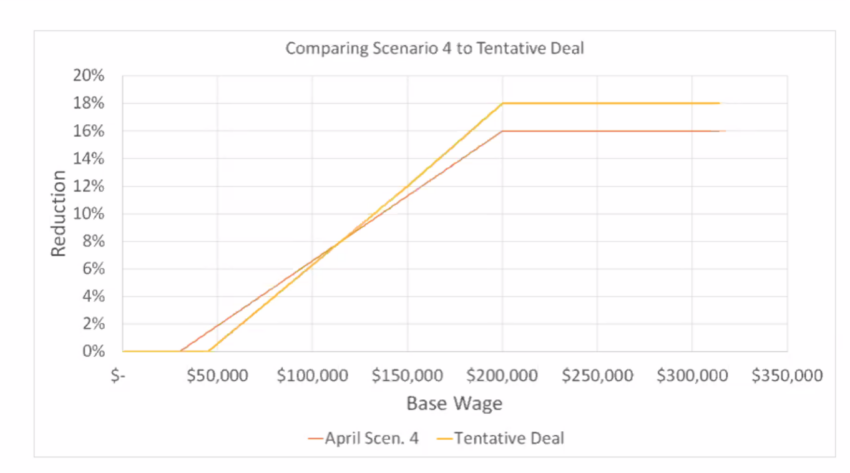
I imagine a lot of thought and effort went into this new “double linear” plan, but it is VERY discouraging to see UA cave to an amazingly selfish admin that won’t take at least the same size paycut as other PAC-12 institutions (like USC, 20% for Prez).
Schill is already taking a 20% cut.
Cancel that – he’s taking a 12% cut. Thanks to a reader for pointing this out. If the voting faculty members approve this plan, that will increase to an 18% cut – assuming tuition and state revenue fall by enough to trigger the plan.
And Schill gets free rent utilities, phone
, car, housekeeper and cook. Nice gig if you can get it. Value?? $5000 month?
Free car? I got my Caballero back today. $444 to troubleshoot and replace a burnt-out ignition coil and module. Ouch – but it’s too damn hot to work on it myself.
Have you seen the house?
more accurately, a double linear ass …
correction, a piecewise linear ass, get enough pieces and you become a spherically symmetric ass …
“Piecewise linear” is what such a function is called. Since there are three knots connecting four intervals of constant slope, where does the “double” come from?
Could someone who has access to the data make, and post, the plot of net money paid out at each income level (i.e. how much money is paid out in total to people earning between $130-$140k)? It would be very useful to help understand how changes to the rate structure will result in changes to the proposed total money taken from employees.
you just need a distribution curve of UO wages paid and I think
that has been published before on this blog or is in the UA slides
so UOmatters should be able to reproduce that; I think bin size of 10K would be good
This offer from UO is crap. How they sleep at night? No admin making 300k is critical to UO mission. Let them claim they will leave. No way they will.
They’ll head back to their home departments at a very slight pay decrease, and a new admin will be hired at an even higher salary. Net increase in salary expense of about 50% since that admin salary now has a “double the normal rate” faculty line associated with it.
New UO Version
Fuck …
no more beer money …
I agree—it’s a crap deal. As a TTF, I can’t support this. Anticipating the impending loss of sports income, the administration insists on paying for their poor investments on the backs of faculty. What happened to pressuring the administration into a wide-ranging discussion of other areas of the budget (besides salaries) where cuts could be made? Such as money-losing sports, a money-losing Law School, and way too many new building projects? Why isn’t there a tax on fat stipends for cars, etc.? The Union needs to do better than this or I will be resigning my membership.
The so called union not just dropped the ball on this. They made it very clear from day one that TTFs interests did not matter. The union folks cover their impotence and incomptence by having NTTFs support whatever they do. I can not imaging any TTF continue paying them after this. Thanks God we can vote with our wallets and feet. If any union leaders read this ( and I hope you do), IMHO you lost it completely and need to resign.
I’m gonna go out on a limb here and guess that this “UA member” commenter is not UO faculty, much less a UA faculty union member.
Bill, c’mon. Do not go on a limb when you are clueless. You are doing a great job with this blog, but do not screw it. I am no economist but this is such a “cheap talk”, and cheap shot. Of course, I am a faculty. How about I call your bluff? I will send you a copy of my faculty ID reducted, of course, to protect my ID, and, if you want, a heavily (also for protection) reducted copy of my paystub that shows that I pay to UA if you agree to contribute a $1000 donation to an organization of my choice?
On a different note, you gotta admit that the union is looking totally toothless and worthless. Not a bit of doubt in my mind. Complete and absolute failure. Whoever is associated with its leadership has to go.
I’m very curious how the Union leadership will attempt to sell this as a win to the rank and file. My read is that the bargaining team gave up a lot without getting very much in return (no increased control over budgeting and priorities, no promises of future raises triggered by economic conditions, etc). This deal is fundamentally similar to the “outrageous” initial offer from the university which Union leadership declined to consider.
So, as someone who is not allowed to be in the bargaining unit, why should a union member vote to accept a pay cut on these terms?
I think you are confusing Pres Schill’s initial offer given that he had a union to deal with, with what he would would done were there no union.
It seems like the union got protection of NTTF positions and FTE. But didn’t they originally say that bargaining over those positions was akin to admin hostage-taking? Didn’t they say they would demand other concessions?
First, can anyone confirm that “the union got protection of NTTF positions and FTE”? Second, in order to “demand” concessions, one needs leverage. What, exactly, would that be in these circumstances? Admin knows we’re not going to strike, and it is really no surprise that they dictated terms here.
Why does the admin know that the Union won’t strike? And surely that’s not the only lever of power available to the Union in order to incur pain to the administration. The whole rationale for a union is to exercise collective power on behalf of its members.
I haven’t yet heard an argument that the Union has exercised maximal power and that this pay-cut agreement is the best possible outcome for its members. But I’d like to hear that argument!
Are we back to average rates now, instead of tiered approach? If I am reading this right, under UO, the pay cut at $160,000 is 13.2%, or $21,120. At $200,000, it is 18%, or $36,000. That means that if we compare two people making $160,000 and $200,000, the amount of the $40,000 earned from $160,000 to $200,000 is “taxed” at ($36,000-$21,120)/$40,000, or 37.2%. That sounds pretty extreme.
Thanks for asking this. Just realized I was reading the charts all wrong, thinking the tax rate was flat for $45K – $160. That’s how most tax codes work, and they tax the “excess” (above 160K) at a higher rate. The only place where that is applied is above 200K!! Besides these rates being excessive, does it not create weird situations where someone just above 160K ends up making less than someone just below 160K?
I believe the rate is a sliding scale between the brackets
someone making 158 k will be taxed slightly less than someone making 162 k
eventually a marginal tax cut chart will come out
The table shows the average tax rates at a selection of different incomes. The actual average rates are a continuous function of income, and are designed to eliminate the inversion problem. Most tax codes are specified in terms of marginal rates, but apparently that was too complicated for Brad. I expect there will be an online calculator soon.
I calculated the “tax” for $40,000 chunks–that is comparing the salaries at the two endpoints. This is not truly a marginal rate, but the results are revealing:
For the $40,000 increment from $0-$40,000: 0.0%
For the $40,000 increment from $40,000-$80,000: 8.0%
For the $40,000 increment from $80,000-$120,000: 17.7%
For the $40,000 increment from $120,000-$160,000: 27.1%
For the $40,000 increment from $160,000-$200,000: 37.2%
For the $40,000 increment from $200,000-$240,000: 18.0%
Same for any higher income than $240,000
I realize that the overall average rate rises steadily to 18%, but this is not what a truly progressive approach would bring us. It is nothing less than attempt to tremendously raise the taxes as incomes rise toward $200,000–and then back off. Particularly hard hit will be senior TTF faculty and those in highly paid fields. But of course that is where there is the highest amount of collective salary to draw on.
Still, I’m voting no on any plan that flattens the average rate at $200,000 or anything like that. A tiered approach, with marginal rates rising with income, is most appropriate in my eyes. We don’t have anything near that with either plan, and I’m surprised the union would consider such a scheme.
The idea middle class folks will be taxed more so that people making more than 200K can preserve their “lifestyle” and their phone and other subsidies is beyond nauseating. Whoever they were in the past and whatever we hear them say today about their values, their actions prove they are scarcely better than your average Republican Senator when it comes to economic justice. That said, we can’t pick the circumstances we find ourselves in and can only seek to improve them.
What do you see as the preferable outcome realized, or made more possible, by voting no on this proposal? Like many, my ears are open and I eagerly anticipate your explanation, or maybe another from others inclined to vote no on this proposal. From where I sit, it is this bad proposal or something even worse, namely, even less progressivity and a couple hundred colleagues have their lives and livelihoods shattered in the middle of a pandemic.
Long-term, the UA really needs to plan for a sustained major strike at a more propitious moment with the main fight being over shared governance. We will forever be locked in marginal gains separated by periods of large losses until we have more influence and input over decision-making processes and greater ownership of outcomes.
This is exactly why we should have a step function of the tax rate, not piecewise linear, with max tax rate for 200K+. Does UA not realize the implications? If this goes through, I am done with the union. I am all for helping out our NTTFs, but not at a steep cost to TTFs who have given their most productive years to the institution.
So, your answer is to kick NTTF to the curb in the middle of a pandemic, even if they too have “given their most productive years to the institution”? If you feel that way it is a lie to say you are “all for helping out our NTTFs”, like they are a charity case or something.
@Environmental necessity
I read “all for helping out our NTTFs, but not at a steep cost to TTFs” as advocating for helping NTTFs with the costs coming mainly from things like ending the law school subsidy, subsidized cars for administrators, etc. It’s not that there were just two options, kicking NTTFs to the curb or having sizeable salary cuts for TTFs, though we’re being told that somehow this was the case.
I’m sure the union is well meaning, but I don’t understand why they didn’t push far, far harder.
Thanks @Oryx. I would have preferred the cost of saving NTTF lines/FTEs to be split something like 25:75 between those making 160-200K vs 200K+. Instead we got 75:25. There’s a reason why neither the admin nor UA has advertised the marginal tax rates!
You sure you understand the diff between ATR and MTR?
@UOM maybe not, educate me. Is the table comparing the admin’s 4/20 plan and tentative agreement reporting average tax rate? The average tax rate stops increasing after 200K which must mean the marginal tax rate also stops increasing. So we don’t really have a progressive tax structure all the way through. Isn’t that what you economists usually want in a “fair” tax code? Apologies if I am plain confused. If not, statements like this in Matella’s email today: “The model is progressive, increasing salary cuts for higher wage earners up to a top rate of 18%” is intentionally misleading.
True that the agreement increases the marginal tax for 200K+ more than the admin’s proposal. The increase looks trivial. It may be the best the union could have done. If so, its saying the union has stopped being effective.
I don’t consider this a ‘steep cost’ either, not compared to what some friends at other institutions are facing (seriously, talk to some of them as the year goes on), and not in light of the security it’s obtaining for the most vulnerable among us. This isn’t permanent, it’s for one year. The spectacle of people complaining that UA doesn’t care about TTF now is amazing, given that a heavy criticism I recall with the negotiations to raise NTTF conditions was that UA was serving only TTF and letting the administration crassly cut adjuncts in SoJC and elsewhere.
One other issue that doesn’t generally come up in thinking about this solution is that, unlike schools in places with a lot of institutions nearby, instruction isn’t fungible at UO. Some NTTF here can’t easily be replaced, especially if they teach specialized subjects. If we jettison good people who are generating tuition dollars because that’s the only place admin cuts, getting them back will be much harder once they move, and the whole institution will suffer. This agreement isn’t perfect, but it preserves the instructional basis of the University, which is kind of important to students who flock to many of our career instructors by reputation. And yeah, I know this is all bound up in the ‘hostage-taking question’ but it’s a trend nationally.
I don’t like a pay reduction either–not after finally getting a decent raise myself–but I have security as tenured faculty, and I think we need more of our colleagues to feel stability even if it entails a cost this year. We’ll have data in hand and lessons learned when we have to return to this in negotiations during the coming AY, so it’s not like this is a permanent reduction.
Can we please get some details? Honestly this looks like a complete waste of negotiation time. Especially for TTF. No added transparency, no anything. Just paycuts. We should assume these cuts will get triggered the day they can be.
Please use a screen name.
cuts can not occur before Nov 15
if enacted, I suspect that the Dec pay check will experience
the cut
Schill is taking a 12% pay cut…for 6 months. That’s a 6% percent cut in annual salary.